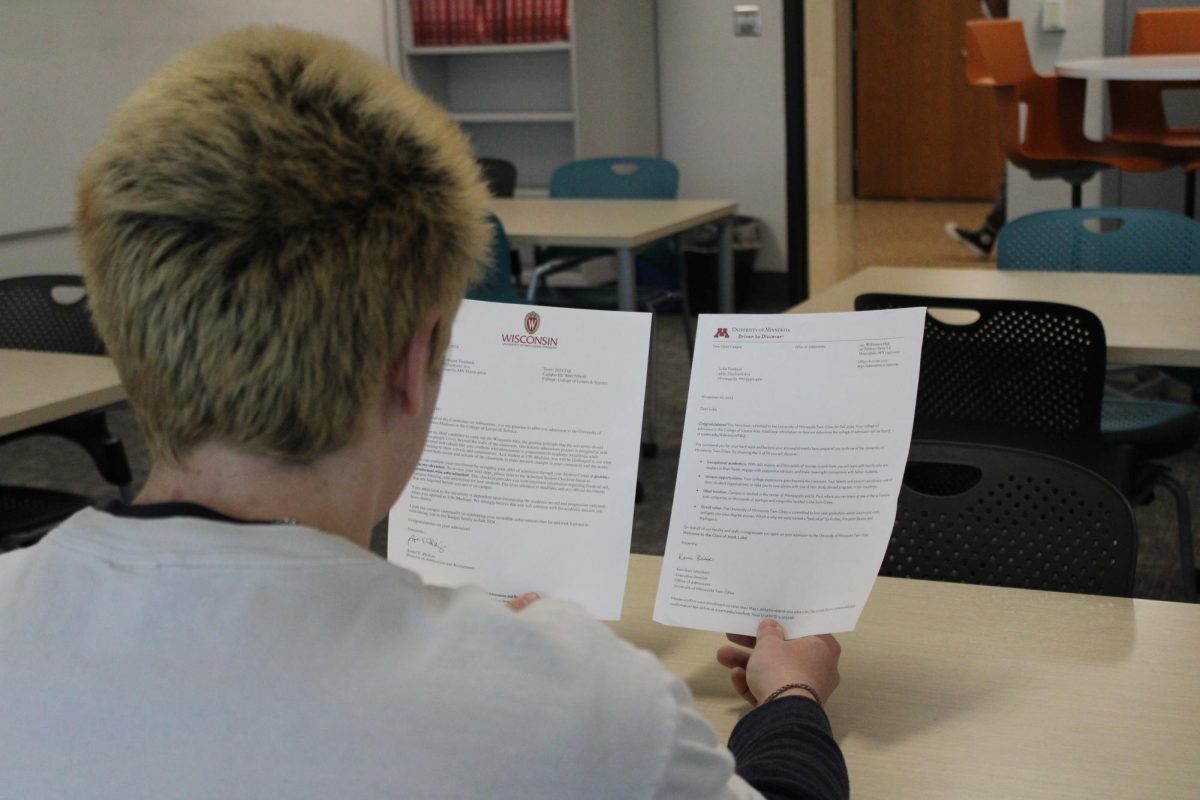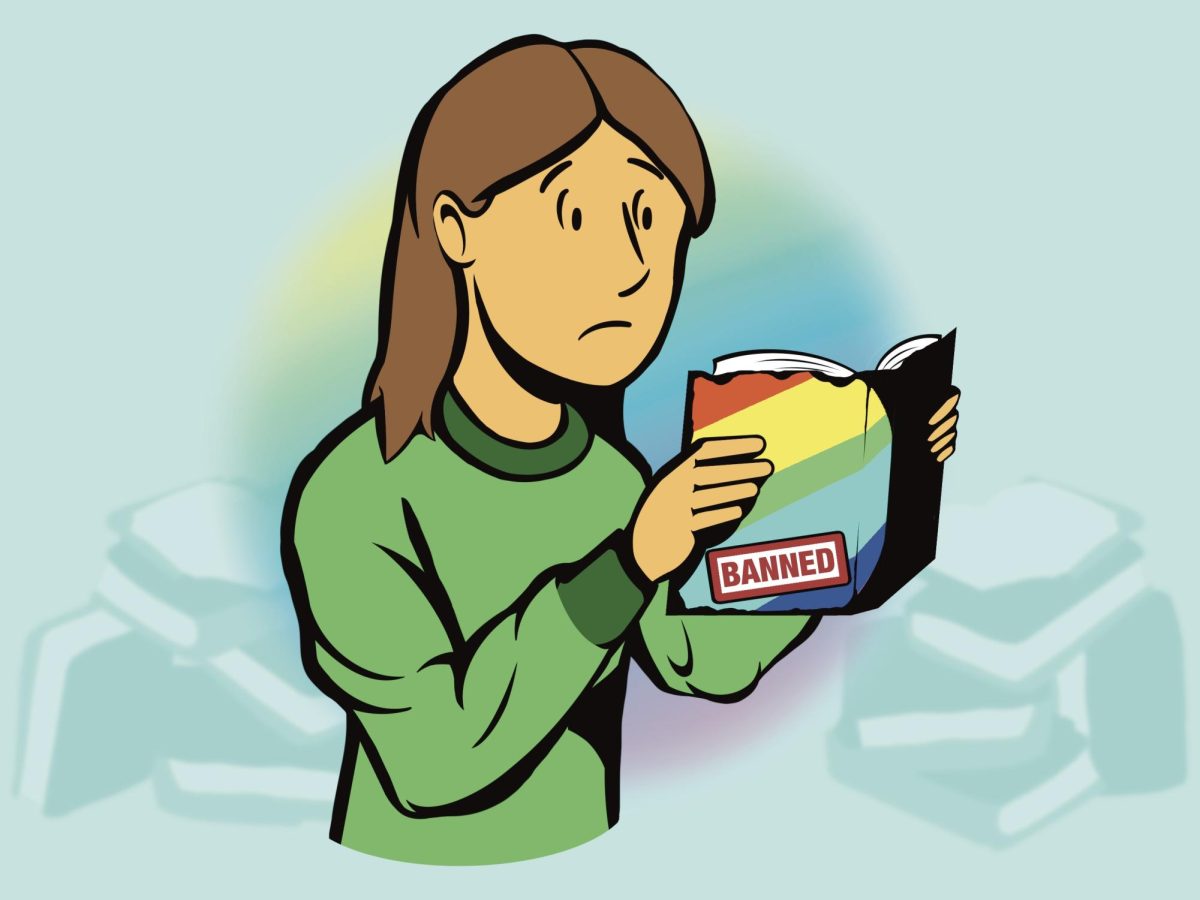Reactions to new grading policies split 50/50

One of the new grading policies sets summative and formative assignments to be weighted on an 80/20 model, with tests and projects being weighted more than in-class assignments. With the newly-implemented summative-formative split, junior Sylvia Tolzin said that formative assignments are less important, so she needs to focus more on summative work to succeed with the new grading model.
“(I need to) work hard on the formatives, but also put more effort into the summative(s),” Tolzin said. “Although this was implemented in the past, it’s fully in solid effect now. It’s important for me to really work hard to study and understand the material before the tests.”
Teaching Specialist in the First-Year Writing program at the University of Minnesota, Corinth Matera, said the 80/20 model for summative and formative assignments could be harmful to multilingual learners.
“I know that some of this 80/20 comes from this idea that it’s more equitable, and I kind of see it in the opposite way,” Matera said. “In writing instruction, for a long time, writing in standard English has been used as a way of keeping students of color, students speaking multiple languages (and) English learners (out with the) ‘grading only on this polished final product.’”
Sophomore Ethan Yakes said he is affected favorably by formative work making up only 20% of his final grade.
“It’s affecting me and everyone around me in a good way, because if you don’t do a small assignment that isn’t as important, it’s not going to ruin your whole grade,” Yakes said.
In another new policy, teachers at Park are now given the option to institute a 50% grading floor, which raises the minimum grade for assignments to half-credit instead of zero. Senior Suweis Hussein said she has been positively impacted by the 50% grading floor in the past.
“Mr. Wilkes implemented that last semester, which worked pretty fine,” Hussein said. “Because if you missed a lesson, it wasn’t plummeting your grade, and instead of having to work your way up, you could dig from a non-plummeted hole.”
According to Assistant Principal Alyssa Gardner, the 50% grading floor, which is set to become mandatory next school year, will allow students to continue to grow academically, rather than discourage learning due to low grade percentages.
“When we don’t have this grading floor, (students) get into a hole,” Gardner said. “When they’re back (and) ready to be demonstrating their learning, that zero percent on things really negatively impacted them. They weren’t able to bring their grade up despite being able to show their learning. (We want) to ensure we’re focusing on a system where it’s truly about students demonstrating learning and not about compliance around work completion.”
Members of Park’s student body offered advantages and disadvantages of the new grading policy. Tolzin said that while she fears her grade may be negatively impacted by the enhanced importance of tests in the 80/20 model, she’s optimistic she will be able to make up missed formative assignments with minimal stress.
“Having almost your whole grade rely on a couple of tests is somewhat frustrating, because sometimes tests do not accurately represent your knowledge as well as you’d like them to,” Tolzin said. “Catching up easier will be better, (though). If I miss a day and I miss an assignment (from) class, my grade wouldn’t automatically tank.”
In English classes, however, teachers will no longer accept late formative assignments. Hussein said teachers not being as forgiving with late assignments could demoralize students in the long run.
“Some teachers are lenient when it comes to grading just because, if you’ve been out sick, that is a reasonable excuse to have a longer period to adjust and do your classwork,” Hussein said. “With the new grading period, I’m not entirely sure how that’s going to last. The strictness might overwhelm most students and me.”
According to Principal LaNisha Paddock, Park instituted the 80/20 policy to underline the importance for students to apply what they have been working on in class onto summative assignments and tests.
“(The 80/20 grading system) is essentially at the core of a standards-based grading model — it provides more consistency,” Paddock said. “The formative 20% is the classwork practice. After you’ve done all the practice, now you can demonstrate that you’ve met these standards.”
Matera said Park’s new grading system dilutes the importance of learning supplementary material, which can harm a student’s overall learning experience.
“It creates this sense that the day-to-day work of the classroom community doesn’t matter,” Matera said. “(In my class), students get a grade at the end of a project — not just on their final product, but also on how they’ve engaged in the process along the way. My grading system shows value for those other activities that are not necessarily summative.”
Park students and administration, along with Matera, gave insight into what Park’s future could look like with the new grading policies put in place. Hussein said she hopes Park amends the new grading policies to accommodate for students who aren’t as confident test-takers.
“If they continue to do it, (they should) implement more rules that are there for students that don’t fit in that conventional way so that they can also catch up,” Hussein said.
Yakes said he expects teachers to create more summative assignments if students are less likely to complete formative assignments with the 80/20 model.
“It’s going to affect how (teachers) run the classrooms a little bit,” Yakes said. “They’re going to prioritize summatives a lot more than formatives. More than before, some students might not do formatives since they don’t think that it matters.”
According to Matera, if the Park administration wants to achieve equity among their students in the near future, they need to consider a reset on how
they approach grading as well as the effects their current grading system has.
“First, they need to have the will to disband those systems and they need to look at equity in a more complex way,” Matera said. “They need to look at the way grading has been used, or is part of the institutional racism that our educational system still needs to work on getting rid of.”
Math teacher Chad Austad said he would prefer if the 50% grading floor could be set independently student-by-student, as every student has their own needs and motivations.
“On an individual basis, the 50% would be good,” Austad said. “There’s certain students I would like to do it for because when I get to know my students, I’ll know which students that 50% minimum will benefit, and I know that this child won’t give up.”
Tolzin said she wishes for teachers to expand what is considered a summative assignment, as she believes there are other ways to complete the learning process besides testing.
“I hope to see that more projects and more effort-based things are put in as summatives,” Tolzin said. “I understand that test-taking is important, but there’s other ways I can represent my knowledge.”















